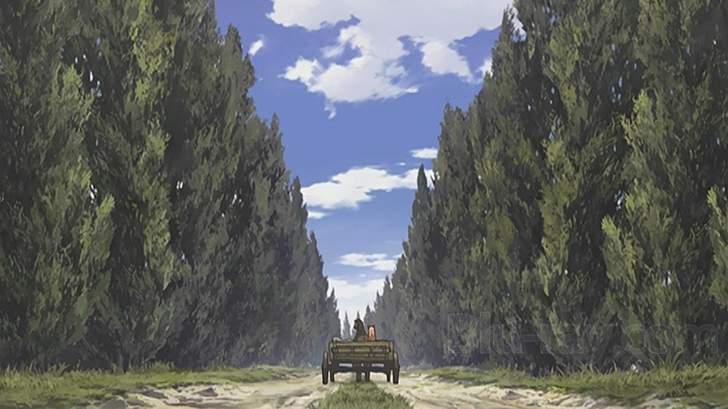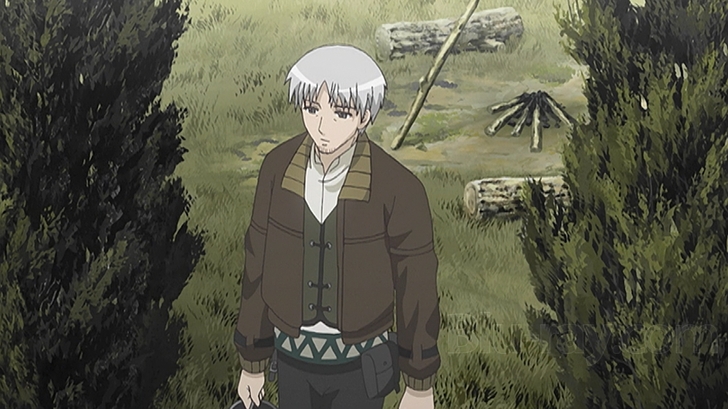Spice and Wolf: Season One Blu-ray Movie
HomeSpice and Wolf: Season One Blu-ray Movie 
FUNimation Entertainment | 2008 | 325 min | Rated TV-14 | Aug 30, 2011
Movie rating
7.8 | / 10 |
Blu-ray rating
| Users | 0.0 | |
| Reviewer | 3.5 | |
| Overall | 3.5 |
Overview
Spice and Wolf: Season One (2008)
Lawrence, a traveling merchant searching for profit, finds a naked girl with the ears and tail of a wolf asleep in his cart. Her name is Holo - a harvest goddess with an untamed beast lurking inside who longs to return to her beloved northern home. Armed with his street smarts and her animal instincts, a simple peddler and a forgotten deity begin a journey through the wild countryside. Along their path, the riches of happiness shall be reaped, even as the bankruptcy which dwells in the human heart is exposed.
Starring: Ami Koshimizu, Jun Fukuyama, Mai Nakahara, Kaori Nazuka, Daisuke NamikawaDirector: Takeo Takahashi
| Anime | 100% |
| Foreign | 95% |
| Fantasy | 25% |
| Romance | 22% |
| Comedy | 22% |
| Adventure | 9% |
| Drama | 1% |
Specifications
Video
Video codec: MPEG-4 AVC
Video resolution: 1080p (upconverted)
Aspect ratio: 1.78:1
Original aspect ratio: 1.78:1
Audio
English: Dolby TrueHD 5.1
Japanese: Dolby TrueHD 2.0
Subtitles
English
Discs
50GB Blu-ray Disc
Two-disc set (2 BDs)
Packaging
Slipcover in original pressing
Playback
Region A, B (C untested)
Review
Rating summary
| Movie | 3.5 | |
| Video | 3.5 | |
| Audio | 4.5 | |
| Extras | 1.0 | |
| Overall | 3.5 |
Spice and Wolf: Season One Blu-ray Movie Review
The Oddest Couple.
Reviewed by Jeffrey Kauffman August 14, 2011The 19th century saw a rather widespread reassessment of Man’s relationship to the Divine. If German philosopher Friedrich Nietzsche’s pronouncement that “God is dead” is perhaps the most famous (some would say infamous) relic of this phenomenon, Nietzsche’s artistic brother-in-arms Richard Wagner might be seen as espousing much the same idea in his Ring Cycle, specifically Gotterdammerung which might be aptly subtitled The Gods Are Dead. Add to this the popularity of ancient myths and folklore as told by Thomas Bulfinch and later deconstructed and analyzed by the likes of J.G. Frazer in his epochal The Golden Bough, and the entire era seems suffused with a questioning spirit which didn’t just accept the “old time religion,” let alone the “really old time religion”. As The Golden Bough deals with (albeit tangentially), the 19th century also saw the rise of an occult magical element as perhaps best personified by another “golden,” The Golden Dawn, the elitist quasi-Masonic organization that saw everyone from William Butler Yeats to Aleister Crowley join its ranks at one point or another, an elite class that went around invoking Egyptian and Babylonian Gods to do their “magickal” (as they spelled it) will. The slow, sometimes desperate and often violent, slog of Christianity to replace paganism has obviously been one of the prime defining sociological movements of the past two millennia. But as the 20th century dawned, it seemed science had artfully outmaneuvered both the Christians and the 19th century iconoclasts who refused to toe the Christian line but who offered little in its place. How odd, then, that a 21st century anime should seek to exploit the rather odd premise that the old ways and old Gods are dying, or at least relegated to the ranks of the irrelevant, but that’s exactly what Spice and Wolf builds its story around. Add in the equally odd element of Medieval economic theory and you certainly have one of the more original premises for an anime in recent memory. But does Spice and Wolf deliver some spice of its own, or does it end up being more of a mongrel feral dog?

Spice and Wolf is set in an amorphous time and place, though it’s obviously the Middle Ages, when agrarian societies still prayed to the harvest gods (as detailed rather exhaustively in The Golden Bough). Spice and Wolf takes that idea and personifies a Wheat Fertility Deity as a female wolf-goddess named Holo. The simple farmers engage in the harvest and play a series of games focused on Holo and her supposed promise for a bountiful return on the plantings. Into this arena wanders traveling peddler Lawrence, who is perhaps romantically interested in the town’s young peddler-in-training Chloe. As Lawrence prepares his camp for the evening, he’s stunned to find a semi-naked young girl in the back of his carriage, one who seems to have wolf-like ears and a long, red bushy tail. This weird amalgamation identifies herself as Holo—yes, that Holo, though Lawrence is perhaps understandably skeptical to believe her. He demands proof, and though the first episode bizarrely cuts to commercial right when Holo is ostensibly revealing her “true form,” when we return from the fade out it’s obvious Lawrence has indeed seen something he can’t quite believe.
It turns out that Holo is indeed a real Deity who is able to assume a semi-human form, and she is smarting from the newfangled attitude of the villagers she long ago promised to provide with bountiful harvests as they have mastered new and perhaps less intangible methods to guarantee good results. Holo has decided to vacate her long residence of the Medieval village and wants Lawrence’s help to return to her native northern home. Her ability to ferret out liars and those with evil intent makes her a valuable ally to Lawrence as he travels the backwoods of a sylvan but rustically unpredictable territory, and though he has qualms, he agrees to help get Holo back to her place of origin.
Spice and Wolf kind of takes the odd couple trope to new and heretofore unknown heights, or depths if you have a less charitable view of this series’ approach. Set up rather like an episodic quest of sorts, the two mismatched main characters move through a series of encounters which more often than not seem to touch on rather arcane theories of Middle Ages economics. That’s right: economics. Lots of talk of various grades of silver ensue, we get brief looks at the feudal systems which were then completely in effect, and Lawrence and Holo attempt to wend their way through a convoluted labyrinth of societal castes and economic strata. Several episodes into the series, Spice and Wolf also brings in the Church (that would be the Christians, in case you were wondering), the literal fundamentalist establishment which isn’t too keen on the idea there’s a pagan wolf-goddess Deity running around in what they consider to be their territory.
As fascinating as this all sounds (no, really—this is indeed a very interesting premise for a series), Spice and Wolf is hobbled, at least initially, by an incredibly slow pace that may turn many viewers off before at least a few fireworks start flying around episode four or five. This show is so unusual, without any requisite action or easily accessible “hooks,” that it takes an enormous amount of patience to wait out the endless speeches in order to glean a little information which gives some insight into the two main characters. The best thing about Spice and Wolf, though, is the interrelationship between Holo and Lawrence, and the gently chiding sense of humor both of these characters exhibit helps to invest the series with a little breeziness it otherwise would seriously lack.
Spice and Wolf at the very least has one inarguable thing for it: there has never been another anime quite like this one. The problem, though, is that along with that innovation in premise, there’s no attendant stylistic or storytelling freshness, and instead we seem to be stuck in a weird hybrid of Middle Ages sorcery and some long ago forgotten treatise on how Middle Ages barter systems worked. Is that enough to really build a successful series around? The second season of Spice and Wolf may ultimately tell the tale as to whether this is an interesting if failed experiment, or a show that resolutely knows it’s peculiar and has the courage to forge its own way, come what may.
Spice and Wolf: Season One Blu-ray Movie, Video Quality 

Spice and Wolf is presented on Blu-ray with an AVC encoded 1080p transfer in 1.78:1. This is a pretty unremarkable looking series, which is too bad, considering its interesting timeframe and characters. Everything is kind of slapdash in terms of animation style, and unfortunately that slapdash quality ports over to the Blu-ray presentation as well. Because the series is rarely brightly colored (with the exception of some of the nicely amber-hued wheat), nothing really pops here. There's lots of grays and browns, and that's about it in many of these episodes, with the possible exception of some nicely saturated blues, a hue which tends to come off best overall in the series. Line detail is acceptable, but the entire image is on the soft side (no doubt a result of upconversion). The Blu-ray exhibits fairly noticeable edge enhancement around some of the character lines, something I personally have never quite seen to this extent on an animated feature before.
Spice and Wolf: Season One Blu-ray Movie, Audio Quality 

Far better is Spice and Wolf's nicely immersive and very well detailed lossless English dub presented in Dolby TrueHD 5.1. The original Japanese language track is also available in lossless Dolby TrueHD 2.0, but after toggling back and forth for a while, I opted for the English dub because the series is so full of nice ambient environmental effects which are so nicely splayed around the soundfield in the surround mix. There are many beautiful moments in this track, a lot dealing with water sounds which are wonderfully precise and lifelike. The series also benefits from a nicely evocative score, one which plays with Middle Ages tropes like plainchant and recorders but blends them in unusual ways. (There are other moments which feature distinctly modern, dissonant string sounds). Dialogue is very well done (the English dub actually may be preferable simply due to the voicework alone), and the overall mix is very artful, with excellent fidelity and dynamic range.
Spice and Wolf: Season One Blu-ray Movie, Special Features and Extras 

- Textless Opening Song (HD; 1:32)
- Textless Closing Song (HD; 1:32)
- Trailers for other FUNimation Releases
Spice and Wolf: Season One Blu-ray Movie, Overall Score and Recommendation 

I must admit that by the time Spice and Wolf wound down its first season's episodes, I was rather surprisingly caught up in the trek these two characters were on. That said, it took an awfully long time to get there, as this series is positively lethargic at times, with lots of talk, talk, talk and very little (if any) action. The setting here is so intrinsically fascinating, and the central premise of a lonely God(dess) consigned to the dustbin of history so compelling, that I really wish I could give Spice and Wolf an unequivocal recommendation. I simply can't though, at least until I've seen the second season, which is due for review soon. Until that time, I can say this series has originality of premise going for it in spades, but that alone can't carry a show if the execution isn't up to par.
Other editions
Spice and Wolf: Other Seasons
Similar titles
Similar titles you might also like

Angel Beats!: Complete Collection
2010

Steins;Gate: Complete Series
Anime Classics
2011-2012

Clannad: Complete Collection
2007-2008

Clannad After Story: Complete Collection
2008-2009

No Game, No Life: Complete Collection
ノーゲーム・ノーライフ / Nōgēmu Nōraifu
2014

Chobits: Complete Series
Anime Classics
2002

Soul Eater: The Complete Series
Classics / ソウルイーター
2008-2009

Toradora! Volume 2
2009-2011

Okami-San & Her Seven Companions: Complete Series
Essentials
2010

Full Metal Panic!: The Complete Series
Anime Classics / フルメタル·パニック!
2002

High School DxD: The Series
Classics
2012

Claymore: The Complete Series
Essentials
2007

B Gata H Kei: Yamada's First Time: Complete Series
2010

Dance in the Vampire Bund: Complete Series
Limited Edition | Combo Pack
2010

Fullmetal Alchemist Brotherhood: Box Set 2
鋼の錬金術師 FULLMETAL ALCHEMIST
2009-2010

K-ON!: Volume 4
2009-2010

The World God Only Knows: Ultimate Collection
Seasons 1-3 & OVAs
2010-2013

Full Metal Panic? Fumoffu: The Complete Series
Classics
2003

No Game, No Life: Zero
2017

Bakemonogatari
化物語 | Limited Edition
2009-2010

